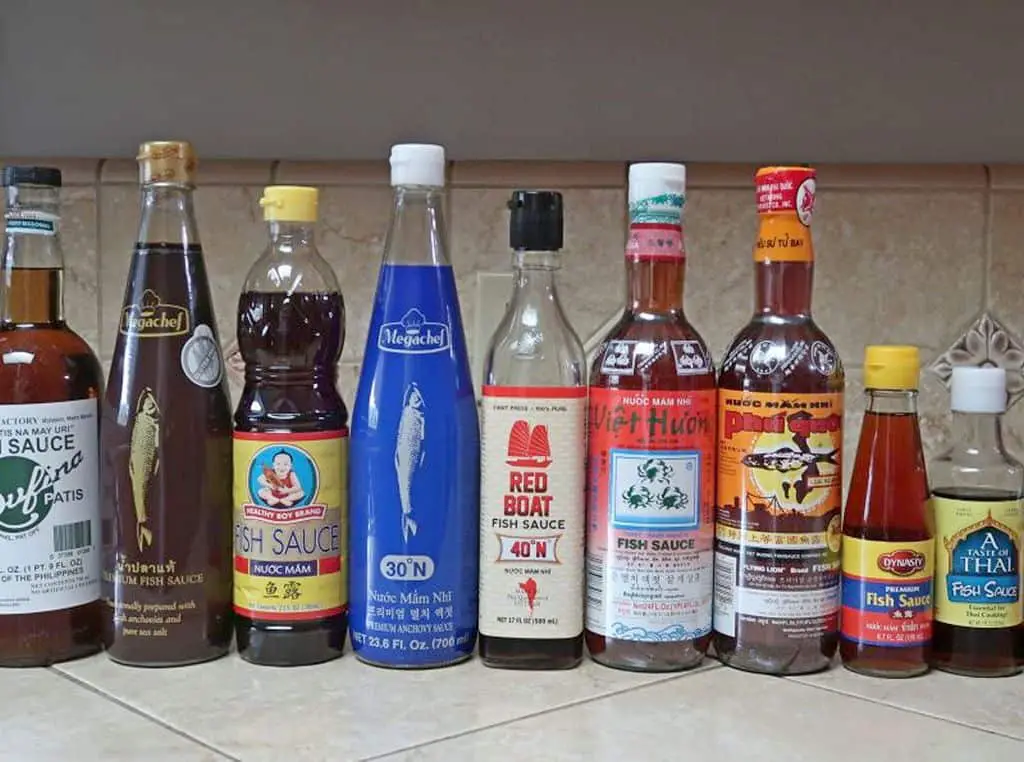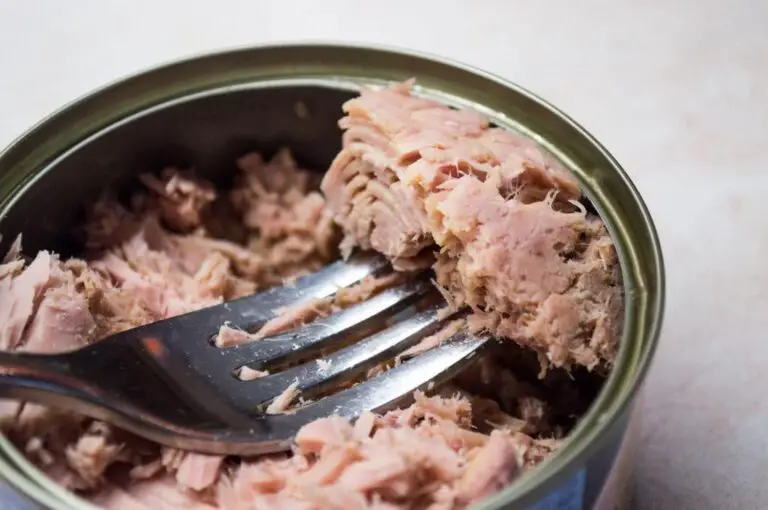Does Fish Sauce Need to Be Refrigerated? Best Way to Store It

Fish sauce is a popular condiment in many Asian cultures because it is bold, salty, and brimming with umami flavor. In Thai, Vietnamese, and Filipino cuisines, fish sauce is so commonly used in cooking that it is comparable to how salt and pepper are utilized in Western cuisines.
When you open a bottle of the thin, dark-amber liquid, you’ll discover that fish sauce doesn’t pull any punches when it comes to its scent; it’s pungent, salty, somewhat sweet, and highly fishy.
At full concentration, fish sauce has a strong smell, but when used in small amounts, it blends into the background of all kinds of dishes.
Fish sauce will make your food taste best when it is of the highest quality.
So, does fish sauce need to be refrigerated? No, fish sauce does not need to be refrigerated. You can keep the fish sauce in the pantry, away from direct heat.
The best way to store fish sauce is in a cool, dark place.
In this article we explore what is the best way to store fish sauce? In addition to that, we will learn fish sauce shelf life and how to prevent food poisoning from this condiment.
What is Fish Sauce?
Fish sauce is a component that cannot be left out of the majority of the dishes found in Southeast Asia. It is often used as a dipping sauce or added to soups and curries. Fish sauce can be purchased at most Asian grocery stores.
Fish sauce is made by first crushing the whole fish (usually anchovies) or krill into a paste. This paste is then mixed with salt and water and left to ferment for several months. This process breaks down the fish proteins and results in a thick, brown liquid that is high in umami.
Fish sauce has a long shelf life and does not require refrigeration. It can be stored in a cool, dark place for up to 2 years.
Why is Fish Sauce so Popular?

Fish sauce is a popular ingredient in many Asian cuisines, particularly Thai and Vietnamese. It is made from fermented fish or shellfish and has a strong, salty flavor.
Fish sauce adds a depth of flavor to dishes and can be used as a condiment or ingredient in marinades, sauces, and soups. It is also a key component of the popular Southeast Asian dish known as nam phrik.
Umami from fish sauce is a savory taste that enhances other flavors, which is why fish sauce is often used as a seasoning or dipping sauce. It can be added to soups, curries, marinades, and stir-fries to boost the flavor.
Fish sauce also has many health benefits. It’s rich in vitamins and minerals, including vitamin B12, iron, and calcium. It’s also been linked to lower blood pressure and cholesterol levels.
Fish sauce is an important source of protein and essential amino acids in many parts of Asia. It is also relatively inexpensive and has a long shelf life.
Does Fish Sauce Need to Be Refrigerated?
Many people are unsure whether fish sauce needs to be refrigerated. The answer is actually quite simple. Fish sauce does not need to be refrigerated because the high acidity level prevents bacteria from growing.
However, fish sauce will last longer if it is refrigerated. If you are not going to use the fish sauce within a few months, it is best to store it in the fridge.
How to Store Fish Sauce in the Refrigerator
If you’re one of the many people who are in love with the salty, umami-packed flavor of fish sauce, you might be wondering how to store it so that it stays good for as long as possible. Here are a few tips for storing fish sauce in the refrigerator:
- Keep it in a dark place. Light can cause fish sauce to break down and lose its flavor.
- Make sure the lid is on tight. A loose lid can allow air to get in and cause the sauce to spoil.
- Don’t store it near other strong-smelling foods. Fish sauce has a strong smell, so you don’t want it to contaminate other foods in your fridge.
- If possible, store it in a glass or ceramic container rather than plastic. Plastic containers can leach chemicals into your fish sauce.
- Keep it in the back of the fridge. The temperature is usually colder in the back, which keeps your fish sauce fresher for longer.
- Don’t store it for more than two years. This is just a general rule of thumb. It will last longer if you follow the tips above. If the sauce starts to smell or look off, it’s time to throw it out.
How Long Does Fish Sauce Last? ( Shelf Life of Fish Sauce)
The shelf life of fish sauce depends not only on storage but also on the quality and content of the fish sauce itself.
When it comes to storing fish sauce, there are a few different options that you can choose from depending on how long you plan on keeping it.
For short-term storage, you can keep fish sauce in the pantry at room temperature. However, if you want to refrigerate it, make sure to do so in an airtight container.
For long-term storage, it’s best to keep unopened fish sauce in the fridge. Just like any other condiment, fish sauce will last longer if it remains unopened.
Fish sauce will last for 1-2 years when stored in a cool, dark place like a pantry or cupboard. Once opened, for best quality, it should be refrigerated and used within 6 months.
When it comes to opened fish sauce, you’ll want to store it in the fridge as well, but in an airtight container. Make sure to transfer the fish sauce into a clean, airtight container.
You’ll also want to avoid opening a bottle of fish sauce and then leaving it on the counter for too long.
How to Tell if Fish Sauce is Bad, Rotten, or Spoiled?
Fish sauce can last a long time if left unopened and stored in good condition. It can be tricky to tell when it’s gone bad. Here are a few signs that your fish sauce is no longer good to use:
- The color has changed. If your fish sauce is no longer that deep, dark brown color, it’s probably time to toss it.
- It smells off. Fish sauce should have a salty, umami smell. If it smells sour or rancid, it’s not good anymore.
- The texture has changed. If the fish sauce is watery or has lumpy bits floating in it, it’s gone bad and should be thrown out.
- It’s been around too long. If you’ve purchased a fish sauce that isn’t refrigerated, it’s best to use it within a year of purchase. If you’re storing your fish sauce in the refrigerator, it can be kept for up to 2 years.
If you’re at all unsure about whether your fish sauce is still good, don’t use it. Instead, throw it out and buy a new fish sauce bottle. It’s not worth risking your health and well-being over a couple of dollars. If you’re at all unsure about whether your fish sauce is still good, don’t use it. Instead, throw it out and buy a new bottle.
Can You Get Food Poisoning From Fish Sauce?
While fish sauce is safe to eat, there have been some cases of food poisoning associated with it. So, can you really get food poisoning from fish sauce?
It is possible to get food poisoning from fish sauce if it is not properly processed or stored. Fish sauce is made by fermenting fish in saltwater, and if this fermentation process is not done correctly, it can lead to the growth of harmful bacteria.
If you do purchase a fish sauce bottle, be sure to check the label carefully to make sure that it has been properly processed. You should also look for a product that has been pasteurized, as this will help to kill any harmful bacteria that may be present.
The symptoms of food poisoning from fish sauce include nausea, vomiting, and diarrhea.
If you experience these symptoms after eating fish sauce, it is important to see a doctor as soon as possible. Food poisoning can be a serious condition, and in some cases it can even be fatal.
Conclusions
Fish sauce is a popular condiment in many Southeast Asian cuisines. It is made by fermenting fish with salt for several months. The resulting product is a thick, dark liquid with a strong, pungent flavor.
Although not everyone will enjoy the fishy smell, it doesn’t linger for very long when added to food. In fact, this condiment will give your food a very rich flavor.
In conclusion, it is not necessary to refrigerate fish sauce. The best way to store it is in a cool, dark place. If you are concerned about the quality of your fish sauce, you can check the expiration date on the bottle.







